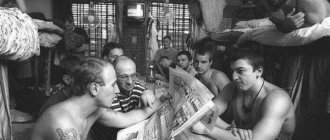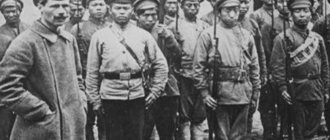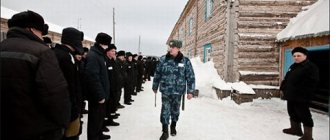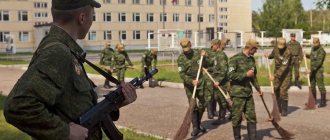- what it is? In the early 60s, correctional labor colonies and settlements appeared in the USSR, where convicts live and work in conditions close to free life.
The point of such institutions is that people convicted for the first time and for minor crimes can undergo correction under the supervision of special services, but without complete isolation from society. In the article we will look in detail at how they sit in a checkpoint - is it easy for convicts to live there, what are the conditions and features of the regime.
Conditions of serving
What is the institution like and how do they serve their sentences here? A colony-settlement looks little like a prison: movement around the territory is free, there are no guards or towers, and there are no high walls with barbed wire. The colony is run by an administration that enforces the rules and organizes the work of the settlers.
According to Art. 128 of the Penal Code of the Russian Federation, the following are sent to colony settlements :
- Persons convicted of crimes committed through negligence and who have not previously served imprisonment.
- Persons convicted for the first time of committing intentional crimes of minor or moderate gravity.
- Persons convicted of crimes committed through negligence and who have previously served imprisonment.
- Positively characterized convicts transferred from general and strict regime colonies.
The convict, as a rule, gets to the colony settlement on his own. Moreover, if the convicted person lived or was convicted in a certain region, then he must serve his sentence in that same region.
After the verdict is passed, the territorial body of the Federal Penitentiary Service is obliged:
- Issue you an order to send you to the place where you will serve your sentence.
- Give money for travel and food for the duration of the trip.
- Create a file for the convicted person (take fingerprints, fill out a form with your photo).
- Establish a period within which the convicted person must arrive in the colony.
You will find more information about what a colony-settlement is in this material.
How to get to a colony - a settlement for convicts from other correctional institutions?
Of course, mitigation of conditions of detention for a serious offense is not provided until certain points in the behavior of the convicted person become obvious. To change the preventive measure, it is necessary to convince the executors of court decisions that the person has deeply repented, reconsidered his behavior in society and is ready to prove that he is worthy of trust.
All these points are quite subjective. But there are also signs that representatives of the law rely on.
First of all, the prisoner must not violate the regime of the correctional facility in which he is serving his sentence, no matter how strict this regime may be.
Good and equal relations and the absence of conflicts with fellow inmates and superiors also speak in his favor.
Impeccable attitude towards work and fulfillment of other duties and instructions of the management of the educational institution.
No complaints of any kind and gratitude.
Active participation in the life of a correctional institution.
A clearly expressed desire of the prisoner himself to change the preventive measure to a colony settlement.
Rights, obligations, prohibitions and restrictions
Convicts have the following rights:
- In the interval between getting up and going out, you can move freely throughout the entire territory of the settlement.
- With the permission of the administration, you can move outside the colony, but within the boundaries of the municipality.
- You can have and wear personal clothing.
- Convicts are allowed to have and use money without restrictions.
- Receive parcels and packages that do not contain items prohibited in the colony.
- You can have dates without limiting their number.
- The work of convicts is regulated by labor legislation.
- Convicts have the right to receive secondary or higher education in absentia, but only in educational institutions located on the territory of the municipality where the colony is located.
Responsibilities:
Convicts are required to work, otherwise penalties will be imposed on them, for example, a ban on leaving the dormitory for up to 30 days or a punishment cell. Convicts who are not engaged in socially useful work cannot count on parole.
Restrictions:
- Leaving the colony without permission from the administration is prohibited.
- The passport and other identification documents are kept in the personal files of the convicted person. Instead, a certificate of the established form is issued.
- Transfer to another place of work is carried out with the permission of the colony administration.
- The administration may at any time conduct a search for prohibited items.
Forbidden:
- Alcohol and any alcohol-based products, including perfume and cologne.
- Narcotic substances, medicines and medical supplies.
- Weapons, including knives, as well as some tools such as axes and hammers.
- Mobile phones, laptops, players and cameras.
- Playing cards.
- Pornographic materials.
- Topographic maps and compasses.
- Vehicles.
On our website you will find other publications about the conditions of detention of prisoners in various correctional colonies, including information about institutions with special regime.
Kinds
There are two types of settlement colonies:
- The first type is organized for those who committed a criminal act for the first time through negligence; the act must be classified as an act of moderate or minor severity. Serving cannot be more than five years.
- The following types of colonies are for those who were transported from other correctional regimes.
Please note: the conditions are the same everywhere, regardless of the type of settlement. There are separate male and female settlements.
Conditions of detention
Convicts live in dormitories with several people per room. Living conditions can vary greatly depending on the colony , usually the rooms have: beds on a metal frame with a mattress, a personal bedside table for each resident, a wardrobe for outerwear, a desk, chairs, a cabinet or shelves for food, a mirror, lamps, etc. It is possible to have a TV and a refrigerator. As a rule, settlers visit the bathhouse once a week.
On the territory of the colony there must be:
- Medical hospital.
- Shop.
- Bathhouse.
- School.
- Library.
- Assembly Hall.
- Rooms for receiving guests and sometimes hotels for them.
What are they?
Two types of colony-settlements are envisaged:
- for persons who have committed a crime through negligence and have been sentenced to a term of no more than 5 years;
- for positively characterized prisoners transferred from general and maximum security colonies.
Colonies can be male or female, or joint. There are also colonies for minors.
Read about how and where minors usually serve their sentences in Russia here.
Schedule
The daily routine depends on the internal regulations adopted in a particular colony . As a rule, it looks like this:
- Get up no later than 5-6 am. This is followed by physical exercise for 15 minutes. Another 10-15 minutes are given for the toilet and filling the beds.
- Morning check - up to 40 minutes.
- Breakfast - 30 minutes.
- The route to work and distribution of instructions is up to 1 hour.
- Working hours are 8 hours in accordance with the law, but labor rights are often violated and working hours can reach 10-14 hours a day.
- Lunch break - 30 minutes.
- Returning from work takes about half an hour.
- Dinner - 30 minutes.
- Educational activities - up to one hour.
- Free time - about an hour.
- Getting ready for bed - 15 minutes.
- Sleep - 8 hours.
Studying in educational institutions takes place according to a special schedule.
Nutrition
Each colony has a canteen, but the food served there leaves much to be desired. As a rule, these are porridges and soups made from cereals and substances resembling “compound fat”, which are classified as products of animal origin.
In the store you can buy your own products , such as: canned meat and fish, pickles (cucumbers and tomatoes), mixed vegetables, dairy products, cereals, pasta and instant noodles.
Dormitories may have kitchens. Depending on the administration's policy, stoves, kettles, pots and pans may be permitted for self-cooking.
An important place in the diet consists of products received through transmission from relatives.
More information about the nutrition of prisoners in the MLS can be found here.
Job
Colonies can be located near populated areas or right in the city. But more often they are found in the dense forests of the north and east of Russia.
In colonies remote from civilization, the choice of work is small : logging and woodworking are hard and dangerous work in unfavorable climatic conditions. It also happens that in such colonies there are much fewer jobs than there are colonists themselves, and in this case, work is a privilege that allows you to have a modest income and after some time count on parole.
In and around cities, work often involves tailoring. Also, with the permission of the administration, you can get a job in a locality nearby. It is unlikely that a convicted person will agree to be hired for a highly paid job, but this could be, for example, work in a factory, in the housing and communal services sector, in the agricultural sector or in the service sector. Since the uniform in the colony-settlement is loose, those around you may not understand that they are working together with the convict or receiving some kind of service from him.
Prisoners' labor rights are often violated:
- convicts work 12 hours a day;
- receive tiny salaries, from which payments for food and other services may be illegally collected;
- convicts are forced to “sign 106th” - that is, agree to free work to improve the territory of the colony.
Convicts are afraid to defend their rights, because otherwise they will face penalties, including a punishment cell: it is enough to “receive two punishment cells” for the colony administration to have grounds for transferring the convict to a general regime colony or denying him parole. It is very difficult to defeat the colony administration in court , and weighing all the risks, the majority of convicts prefer to put up with the violation of their rights.
It happens that after arriving in the colony they offer an appointment to a good position for a certain amount of money. This practice of purchasing positions does exist in some colonies. However, you should not agree to this without knowing who you are dealing with: they may deceive you.
Studies
According to paragraph 4 of Article 129 of the Penal Code of the Russian Federation, a convicted person has the right to receive secondary vocational and higher education, the form of education is correspondence. You can only enroll in educational institutions located in the same municipality as the colony.
Education is a good basis for incentives and subsequent parole , and the education received will be useful after release.
Entertainment and relaxation
In accordance with labor legislation, convicts are guaranteed an 8-hour working day and two days off, but these standards are often not respected, and colony residents do not have much free time.
Settlers have different options for spending their leisure time:
- On the territory of the colony there is a library and an assembly hall. There may also be a cinema and TV rooms.
- Various games are popular, such as backgammon, as well as card games, despite their formal ban.
- In case of good relations with the administration, it is possible to visit a nearby settlement.
- On holidays, it is customary to organize feasts, eating products received from the transfers. Sometimes settlers manage to smuggle in alcohol or buy it from the wardens. Some settlers even make mash on the territory of the colony, constructing ingenious hiding places for this.
Religion
The colonies are periodically visited by priests, and some even have chapels built ; in regions with a Muslim population, mosques can be found in the colonies. But problems may arise with performing namaz: although, according to the law, the colony administration does not have the right to interfere with religious rituals, in practice, strict adherence to the generally accepted regime is more important for the administration.
Dates and visits
Visits are an important part of a prisoner's life to maintain morale.
Settlers have the right to have visits without limiting their number. Small hotels for visiting relatives may be located on the territory of the settlement.
There is no limit on the number of dates only in KP. You can find out how short-term visits are conducted in institutions with other regimes in this article, and here we talked about the conditions for obtaining and holding long-term meetings with prisoners.
Transfer of products and things
Residents of the colony have the right to receive parcels and money transfers in any quantity.
You will find more information about the rules for transfers to convicted persons in the MLS in a separate article.
Is it possible to wear long hair?
Women have the right to wear long hair , but many cut their hair short for convenience. It is not customary for men to wear long hair, although formal prohibitions or permissions depend on the internal regulations of the colony.
Using a mobile phone
Mobile phones are prohibited in all correctional institutions of the Russian Federation, which, however, does not prevent convicts from using them everywhere.
The severity of the ban depends on the policy of the administration , which in turn is caught between two fires: on the one hand, the storage and use of mobile phones is directly prohibited by law, on the other hand, if this ban is defended too harshly, convicts may begin to rebel, sabotage work and engage in sabotage.
As a rule, the administration builds a compromise policy in which periodic searches and seizures of mobile phones take place, but this does not happen very diligently and often, so settlers have the opportunity to use mobile phones, storing them in hiding places on the territory of the colony. Often the guards themselves are engaged in selling phones several times more than their retail price.
Is it possible to go home for the weekend?
The law states that convicts can leave the territory of the colony only “if it is necessary due to the nature of the work they perform or in connection with their studies,” that is, formally it is impossible to go home on the weekend . However, in many colonies it is possible to go home for the weekend if you have a good and trusting relationship with the leadership or for a certain amount of money.
At the same time, the law also states: “Convicts who do not commit violations of the established procedure for serving a sentence and who have families, by order of the head of the colony-settlement, may be allowed to live with their families in a rented or their own living space located within the boundaries of the colony-settlement or municipal entity , on whose territory the colony-settlement is located.”
Thus, if a convicted person’s house is located next to a colony, he has the opportunity to negotiate with the administration about living with his family.
Are hours allowed?
In a settlement colony it is allowed to wear a wristwatch, but in prisons and pre-trial detention centers - not.
With a clear conscience
The quarantine is located on the second floor of a hut on chicken legs. There are five armored beds, a water cooler, an electric kettle, a wardrobe, dishes, and a TV. Something like a dorm at a university, only more comfortable.
Convicts spend the first ten days there - they are studied in depth by medical staff, and operatives monitor their behavior.
Next to the squad leader. He gave two receipts - on the criteria of behavior and “social elevators in the institution, on the involvement of convicts in work without pay (for landscaping the territory no more than two hours a week). I wrote one statement - that my whereabouts should not be reported to anyone. Otherwise, a statement is written where you can indicate people who would do well to inform.
I went outside and decided to quietly smoke on a bench and think about the situation. And then over the loudspeaker: “Convicted Kotlyar, appear...”. It gives me goosebumps. The pea soup was quite edible, but I couldn’t eat the oatmeal with meat.
It’s not like even eating it – he took a sip and spat it out. However, the convict who was delivering the food strongly recommended eating: “Dig inside - there’s a lot of meat there.” I moved into quarantine quickly and received a reprimand for not knowing how to make a bed. After what period can I apply for parole from a colony settlement? Well, I don’t know - as for me, it doesn’t seem to be lumpy.
who loves and waits for their other halves or brother and son from prison, I invite you to the site http: //www.lubluzeka.ucoz.ru/
I had a guy sitting there, telling me that he could even rent his own house and dates were not limited. I would like to be there with him, but I didn’t find that time. We met when he was already in general. One disadvantage of settling there is that it doesn’t work; if the period is long, it’s a big problem. Nowadays they don’t seem to sit there with the big ones. Listen, I'm so jealous of you. I'm still 2 years 8 months. We're hoping for success.
Is it possible to compare a colony settlement with a zone? - it’s like day and night, - it’s like the sun and the moon. COLONY SETTLEMENT IS SUCH A FUCK WHERE EVEN FAGOTS AND SLIMS MURR, SCREAMING THAT THEY ARE FUCKING DECENT. THERE ARE NO CONCEPTS THERE. AND ANY DECENT PRISONER, HAVING GOT THERE, WOULD GIVE THE PUSSY TO SOME ASSHOLE IN ORDER TO BE TRANSFERRED TO GENERAL SECURITY. SO IF YOUR FAVORITE IS THERE, I CAN SYMPATHATE. A friend was imprisoned in the Smolensk region, there were no violations, the settlement was assigned by the court. By the way, when you are released from a village on parole, there is another plus, in addition to everything else, they are released on the same day, you don’t have to wait 10 days.
So there you go.
Severe punishment or holiday camp?
Sentence to a penal colony is a relatively mild form of punishment available in Russian legislation. However, living conditions very much depend on the policies of a particular administration.
As a rule, prison inmates strive to be transferred to a colony-settlement, but it also happens that in some colonies such unbearable living conditions have been created that settlers are willing to deliberately violate the rules of the colony and even commit crimes in order to be transferred to other correctional institutions.
Video on the topic
Next you can watch a video about how they live in colony settlements:
Despite the seeming mildness of the conditions of detention in colony settlements, the reality and penal legislation in relation to this penitentiary institution have a slightly different meaning. It’s worth starting with a short summary that the current legislation stipulates that the measure of influence on the criminal must be commensurate with the severity of the crime he committed.
How in practice they are differentiated in the crime/punishment ratio is a controversial and ambiguous issue. Since many citizens of our country agree with this opinion: “For stealing a bag of potatoes you are sent to prison, and for stealing a billion rubles you are sent under house arrest.”
Unfortunately, confirmation of this theory can be repeatedly found in existing judicial practice, which, of course, cannot suit citizens. The complexity of these relationships to some extent led to a certain reorganization in 1963 of the correctional labor house, which was in service in both the Soviet Union and the RSFSR, into correctional labor colonies-settlements, which were transformed in 1997 into modern colony-settlements.
And the conditions of detention in them established by the Criminal Executive Code of our country will be discussed in this article.
Conditions of serving a sentence in a penal colony.











